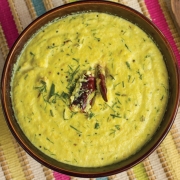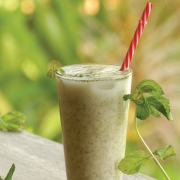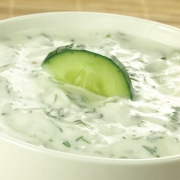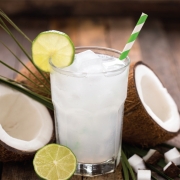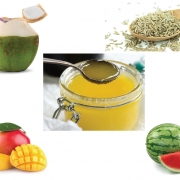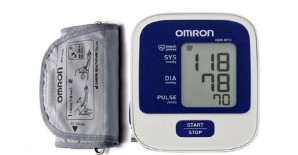
Health

Food is the best weapon to beat the heat, says wellness consultant Naini Setalvad
Come summer and the temperature begins to soar. And for many, the sweltering heat can result in heat strokes, skin eruptions like boils and rashes, summer cold, diarrhoea and other ailments. This is more common among silvers who tend to fall ill owing to high internal body temperatures. Besides heat, even the loss of electrolytes can cause weakness and dizziness and lower immunity.
The best weapon to battle heat is food. Traditional Indian physicians have determined that there are two categories of foods: heating and cooling. Our nutritional needs vary from season to season and nature has provided us with seasonal foods to keep ailments at bay. In summer, your body needs plenty of water. So, as the temperature goes higher, introduce foods containing a high amount of water, natural salt and natural sugar to your daily diet. These foods are easily digestible, soothing and cooling and reduce body temperature. They also help boost immunity, increase energy levels and prevent heat strokes. The focus is to stay hydrated, active and healthy throughout the season!
SUMMER MUST-HAVES
Water: The one-stop solution to most summer ailments is water. As long as your body is hydrated, you will feel cool and refreshed. The natural vitamins and minerals found in water make you feel alert throughout the day. Water also helps transport nutrients in your body. Keep drinking plenty of water to prevent your body from getting dehydrated.
Coconut water: Another simple solution to stifling summer complaints is coconut water. A natural source of electrolytes, it also counteracts feelings of dizziness.
Jal jeera: A popular summer drink, it replenishes your body with salt and micronutrients lost owing to increased perspiration. The cumin seeds it contains provide potassium. This drink boosts energy and serves as an excellent replacement to aerated drinks.
Ripe mango: This fruit is sincerely misunderstood. Available exclusively in the summer months, ripe mango is rich in Vitamin C, betacarotene and natural sugar and contains zero fat. The excessive fibre helps prevent constipation in silvers.
Herbal infusions: Gargling with warm water mixed with salt and turmeric helps keep the summer sore throat away. The salt and turmeric kills germs and clears infections.
You can also drink tea infused with flavours like peppermint or lemon—drink plain or sweetened with stevia. These infusions keep summer ailments at bay without unnecessary calories.
Raw mango: Eating raw mango daily ensures you do not catch the summer cold. Its high Vitamin C content prevents heat and sun strokes, increases immunity, and even prevents anaemia. Mango panna is also a wonderful drink as it serves as an excellent coolant.
Yoghurt: High temperatures tend to cause irritable bowel syndrome. Yoghurt is high in probiotics that can help settle the stomach. Churn it to make buttermilk and add roasted cumin seeds, salt, mint and coriander. Yoghurt is also an amazing coolant.
Watermelon: This is a natural thirst-quencher packed with important antioxidants while its calorie content is negligible. When served chilled, watermelon and muskmelon are ideal ways to beat the summer heat and boost immunity. Melon seeds also help clear phlegm and benefit the intestines.
Fresh vegetables: There is a variety of fresh produce available in summer. Cucumbers contain 90 per cent water and zero fat. Tomatoes are high in water content and natural antioxidants while having zero fat. Onions are known for their cooling properties and their ability to draw out the summer heat from the body. In the Indian desert lands, people are known to keep onions under their hats and turbans to prevent sunstroke. Add the entire gourd family—white, bitter, snake, pointed—to your table; these water-based vegetables are light on the digestive system. They also serve as excellent coolants and prevent boils and rashes during summer.
Light curries: Avoid heavy and creamy gravies in summer and switch to lighter curries made from bottle gourd, pumpkin and long gourd. Add spices and condiments like garcinia indica (kokum) and cumin seeds to your curries. These power-packed meals are cooling, full of fibre and antioxidants, and boost immunity.
Dahi kadhi: Dahi kadhi (curry made of yoghurt) and fajeto (a popular Gujarati dish made from mango juice and yoghurt) are lighter and easier to digest in summer than heavy dals and curries.
Light grains: Many food grains tend to make you feel heavy and lethargic in summer; so ensure your total meals contain no more than 20 per cent of grains. In addition to wheat, include jowar, jav (barley) and brown rice to your meals; these are lighter and less heat-producing than bajra and maize. They also help reduce boils and rashes.
Fennel seeds: Popularly known as saunf or variyali, fennel seeds work as an excellent mouth freshener. They stimulate intestinal juices, promote digestion and cool the body. Drinking keeps the mind and body fresh.
Cow’s ghee: Cow’s ghee works well in both summer and winter. Try to cook your meals in cow’s ghee or spread a dollop of it on your rotis. Ghee is nutritionally rich, burns fat and strengthens the immune system. Ghee can also be applied on rashes and boils as it absorbs heat and cools down the affected area. Besides ghee, a paste of aloe vera or fuller’s earth (multani mitti) can also be applied on external summer ailments.
Lemon: Lemon is an excellent source of Vitamin C. It is also a great taste enhancer; squeeze it on your food to lend it a tangy flavour. Lemon also helps in summer ailments such as heartburn and dehydration. A glass of chilled lemon water refreshes and re-energises your body completely.
FOODS TO AVOID
To survive the summer heat without discomfort, you need to eliminate certain foods from your diet. These include heat-producing oils such as mustard oil and sesame oil. Oily, creamy gravies should also be discounted from any meal. Egg, poultry and red meats also up the body’s heat quotient so avoid eating them. The fish available at the end of summer season is not of good quality so refrain from consuming it. Ideally, stay away from non-vegetarian food and alcohol. Also avoid fried foods that increase disposition to boils and lower immunity.
The soaring summer heat often makes you crave chilled foods such as ice-cream but these are difficult to digest so avoid them as much as possible. Switch to yoghurt or fruit-based yoghurt instead. Avoid mixing mango with food or milk as it tends to increase body heat and leads to boils. Chilled aerated drinks or sherbets are tempting but they increase your chance of throat infections, so stay away from them too. Nuts and seeds also promote heat so minimise them in your summer diet.
COOLING RECIPES FOR SUMMER
FAJETO (MANGO-YOGHURT CURRY)
Ingredients
- Fresh mango pulp: ¼ cup
- Yoghurt: 1 cup
- Besan (Bengal gram flour): 1 tbsp
- Ginger-green chilli paste: 1 tsp
- Turmeric powder: ¼ tsp
- Jaggery (gur): 1 tbsp
- Water: 2 cups
- Salt to taste
For the seasoning
- Cinnamon: 2 sticks
- Cloves: 2-3
- Dried ginger (soonth): ¼ tsp
- Oil: 1 tbsp
- Mustard seeds: ¾ tsp
- Cumin seeds: ¼ tsp
- Red chillies (boriya mirch): 2-3; small, round
- Asafoetida: ¼ tsp
- Curry leaves: 6-8
Method
Add the mango pulp, yoghurt, besan, salt, jaggery and water in a pan; mix well and keep aside. Combine the cinnamon, cloves and dried ginger and pound into a coarse powder and keep aside. Heat oil in a deep pan and temper the mustard seeds and cumin seeds. When the seeds crackle, add red chillies, asafoetida, curry leaves and the pounded spices. Sauté on medium flame for 2 minutes. Slowly pour the mango and yoghurt mixture in and add the ginger-chilli paste; mix well and simmer for 10-12 minutes, stirring occasionally. Serve hot with rotis or rice.
TEMPERED BUTTERMILK
Ingredients
- Buttermilk: 2 glasses
- Cumin seeds: 1 tsp
- Ginger: ¼ tsp; finely chopped
- Mint leaves: 1 tbsp; finely chopped
- Coriander leaves: 2 tbsp; finely chopped
- Green chillies: 1-2; finely chopped
- Cow’s ghee: ½ tsp
- Rock salt to taste
Method
Heat ghee in a pan and add cumin seeds to it. When it starts to splutter, switch off the flame. Add this tempering to the buttermilk along with ginger, mint leaves, coriander leaves, green chillies and rock salt and mix well. Chill for some time and serve.
LAUKI RAITA
Ingredients
- Plain yoghurt: 250 gm; low fat
- Bottle gourd (lauki): 150 gm
- Mustard seeds: 1 tsp; pounded
- Green chilli: 1; finely chopped
- Coriander leaves: 1 tbsp; finely chopped
- Salt to taste
Method
Peel and grate the bottle gourd and keep aside. Beat the yoghurt and mix it with the grated gourd. Add salt, pounded mustard seeds, green chilli and coriander leaves to it and mix well. Adjust consistency; chill and serve.
COCONUT AND ROSEWATER PUNCH
Ingredients
- Coconut water: of 1 coconut
- Coconut cream: 1 tsp
- Rosewater: 4 tbsp
- Lemon juice: ½ tsp
- Mint leaves to garnish
Method
Blend the coconut water, coconut cream, lemon juice and rosewater in a blender. Garnish with mint leaves and refrigerate for some time. Serve chilled.
Setalvad is an obesity and lifestyle disease consultant who offers diet counselling at Health for You, a wellness clinic in Mumbai, as well as online. Visit www.nainisetalvad.com for more details or write to contact.us@harmonyindia.org if you have any queries for her
Photos: iStock Featured in Harmony — Celebrate Age Magazine April 2018
you may also like to read
-
Hot tea!
If you enjoy sipping on that steaming hot cup of tea, think twice. New research establishes a link between drinking….
-
Weight and watch
If you have stayed away from lifting weights at the gym, thinking it might not be a good idea for….
-
Toothy truth
Research has established a clear association between cognitive function and tooth loss when cognitive function score was categorised into quintiles…..
-
PRODUCT OF THE MONTH
Automatic Blood Pressure Monitor Measure your blood pressure and pulse rate with no fuss Hypertension, or high blood pressure, could….



